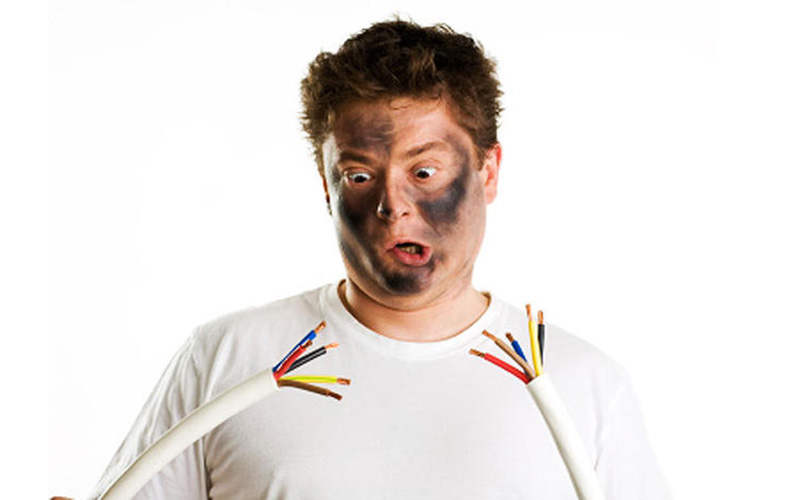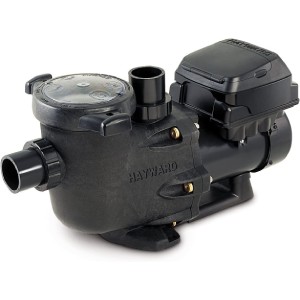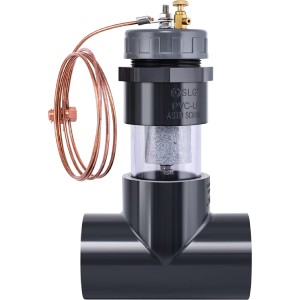- Salt Water Pool and Spa
- Inground Pool Heaters
- Gas Pool Heaters
- Gas Pool Heater Troubleshooting
Gas Pool Heater Troubleshooting
Gas pool heater troubleshooting might be necessary if your heater suddenly stops working, you notice water leaking or you're hearing loud noises. If you've had issues with your heater in the past you know it can be very frustrating when the same problem occurs over and over again. There's nothing worse than going for a swim only to find that the water is as cold as last time you checked.

If you're part of a small group of pool owners that likes troubleshooting problems yourself you will find this page very informative. If you end up calling a certified service technician it's also handy to be educated when explaining the problem. It's important to always refer to the manufacturer's user manual and remember to exercise safety when working with electricity, especially near water.
Gas Pool Heater Troubleshooting List
Gas pool heater troubleshooting probably isn't something you want to do on a Saturday morning especially if your pool is freezing and you just want to get in for a swim. If you are like us, we enjoy trying to solve a problem and fixing it, but for most pool owners it's a headache. You've probably spent a fair amount of money on a gas pool heater and you just want it to heat the water up. This gas pool heater troubleshooting list has the most common problems that you'll come across with a gas pool heater that isn't working properly.
- Heater won't turn on
- Pilot light won't ignite
- Pilot light keeps going out
- Water isn't reaching desired temperature
- Heater cycles on and off frequently
- Heater is leaking water
- Rust in the pool from the heater
- Heater is making loud noises
Gas Pool Heater Won't Turn On
A gas pool heater not starting is the most common problem and unfortunately can be caused by a number or things. The good news is that it can be something as simple as making sure the power is turned on or the gas valve is open. If the the gas pool heater service light is also on, you will most likely need to call a service technician to fix the problem.
- Make sure the heater switch is in the ON position. This includes the switch on the heater and the main power supply breaker for the heater.
- Ensure that all valves are in the OPEN position. This includes the gas valve, gas supply valve, plumbing and filter valves.
- Make sure the pilot light is lit. If it isn't, continue to the following gas pool heater troubleshooting step.
- Make sure the thermostat is set to a higher temperature than the current water temperature. If you are using pool automation controls to set your water temperature, check that also.
Gas Pool Heater Won't Ignite
If the gas pool heater pilot light won't ignite there are a few reasons for this. It's something that can be checked easily but if the problem isn't visible you may need to call a service professional to inspect further.
- Ensure that there is gas getting to the heater. Low gas pressure or NO gas can be caused by a closed gas line supply valve, obstructed gas line or an empty propane supply tank.
- Make sure there is adequate air supply and venting. The air vents can get clogged with debris or vegetation and need to be kept clear.
- Pilot light tubing or orifices may be clogged. They can become clogged by rust, dirt, insects or vegetation over time.
- Ensure there is no internal moisture or water. Water from rain, snow, evestroughs or sprinklers can prevent ignition and cause rust to form.
Pilot Light Keeps Going Out
If you manage to get the pilot light lit intermittently but it goes out before heating the pool completely, you may have a number of things happening. This step of gas pool heater troubleshooting can be difficult if there is no pattern to the pilot light extinguishing.
- Ensure the pilot light isn't being forced out by wind or water. Direct sprinklers and rain spouts away from the heater or use a cover that will keep rain and snow out. You may need a pool heater wind stack to prevent wind from reaching the pilot light.
- Make sure there is adequate gas supply. See above for recommendations about gas supply.
- The pilot light may need replacing. Use a multimeter to test for output to see if it is low or not powering at all.
Gas Pool Heater Cycles On and Off Frequently
Gas pool troubleshooting can be tedious when the problem isn't easily recognized and needs a thorough investigation and it might be required for this issue. If the cycling on and off is accompanied by loud banging noises then be sure to read heater is making loud noises below.
- Inadequate water flow or malfunctioning pressure sensor. Low water pressure can be caused by an improperly sized pool pump, dirty filters, closed or partially closed valves, an external bypass that needs adjusting or the water connection is reversed. If you have ample water pressure, you may have a faulty water pressure switch that needs to be replaced.
- Faulty thermostat. If you have determined that the thermostat is set correctly, you may have a thermostat that is faulty or out of calibration.
- Heat exchanger has lime or calcium buildup. Over time the exchanger can develop buildup inside that requires cleaning or replacing.
Hayward Variable Speed Pool Pump 1.85 HPIf you click on this link and make a purchase, we may earn a commission. |
Water Isn't Reaching Desired Temperature
If your pool water isn't reaching the desired temperature there are few things that might be causing this frustrating issue. It might be a complex issue that will take a bit of research and learning about your pool if you haven't done so already. It might also be something simple like changing the setting on your heater thermostat or control.
- Thermostat is set incorrectly or malfunctioning. Take a look at the heater thermostat on the unit itself and if you are using a mobile or automated control, double check that it's set properly as well.
- Heater is too small. There are pool heater sizing calculations that will give you an idea if your heater has enough BTU's to keep you pool heated based on water volume and ambient air temperature.
- Ensure gas line valve is open and unobstructed. See above for more information about checking gas lines.
- The high limit switch is being activated. The high limit switch might be getting activated due to overheating caused by poor ventilation or the heater being overworked due to improper sizing. The remedy is a larger heater or supplementing with a solar powered pool heater, electric heater or heat pump pool heater.
Gas Pool Heater is Leaking Water
If you notice water around the base of the heater you might be pleasantly surprised to learn that it's an easy diagnosis when it comes to gas pool heater troubleshooting. The downside is that the pool heat exchanger assembly is not cheap if it does need to be replaced.
- Worn out or damaged heat exchanger. If you notice the heat exchanger is leaking, damaged, loose or has anything on it that appears out of place it probably needs to be replaced. It can get damaged by chemicals in your pool or during the winter if the pool and hardware aren't winterized properly.
- Water pressure is too high. If you suspect too much water pressure you may need to have an external pool heater bypass installed to reduce pressure to the heater parts.
- Loose or worn out parts. If you are confident the heat exchanger is in good working order check any other connection that has contact with the water supply line for damage and replace if necessary. This includes gaskets, o-rings, drain plugs and any other joints.
- Condensation when the heater is ON and burner is lit. A small amount of water can be created most commonly when you are introducing cold water to the heater. This is normal and doesn't indicate a problem.
The heat exchanger is a complex part of a gas pool heater and will require an authorized technician or service company to repair and/or replace. A technician will perform routine gas pool heater troubleshooting as part of their service call and provide a quote for work required once the problem is diagnosed.
Gas Pool Heater Banging Noise
When diagnosing a gas pool heater banging noise there is one common culprit, an open external water bypass left open that shouldn't be. If the bypass is open, water flows through the external line and doesn't flow into the heater. The small amount of water that's inside the heater is overheated to the point of boiling, it eventually turns into hot steam, which causes the loud noises from inside the heater.
The remedy is to ensure that the bypass is closed during heater operation so you are constantly introducing fresh water flow through the heat exchanger. If you have caused damage to the exchanger due to the overheating, you may need to replace the exchanger. Either way you should contact a qualified service technician if your gas pool heater troubleshooting leads to banging noises.
If you are hearing a whistling noise coming from your heater you most likely have low gas pressure. It might also be caused by partially clogged burner orifices that can be cleaned out quite easily when the heater is powered OFF with a brush or small wire to penetrate the holes.
Rust in the Pool from the Heater
The last but not least gas pool heat troubleshooting problem is rust flakes in your pool water. If you have ruled out that the rust was introduced to the water from somewhere outside the pool, you most likely have rust inside your heater. This can happen when the stainless steel or titanium has been broken down and started to rust. Most reputable gas pool heaters manufactured today are extremely resisted to rust and corrosion but it can happen in extreme cases.
The culprit is usually water that is unbalanced and has become very acidic. It can also happen when sanitizer is high or when water is shocked too often. In both cases, the parts can deteriorate over time and lead to rust. Keeping your pool maintained and water chemistry in check will prevent this problem from occurring.
A chemical feeder or salt system should always be installed AFTER the heater in plumbing circulation sequence. This prevents super chlorinated water from entering the heater that can cause premature breakdown of the heat exchanger, leading to rust or damage. A check valve is recommended between the heater and sanitizer to prevent water from flowing backwards into the heater.
Sacrificial Zinc Anode for Salt Water PoolsIf you click on this link and make a purchase, we may earn a commission. |
Gas Pool Heater Frequently Asked Questions
If you didn't find your question in the gas pool heater troubleshooting section hopefully you find an answer below. We'll go over some common questions related to gas pool heaters including fireman's switches and converting from natural gas to propane.
- Is a Fireman Switch necessary?
- What power supply do I need?
- Can I convert from natural gas to propane or vice versa?
- How do I winterize my gas pool heater?
- How can I save on pool heating costs?
Is a Fireman Switch Necessary?
Probably not. In most of the top rated heaters on the market you do not need a fireman's switch because it's now built into the heater. If you are in doubt, contact the manufacturer of your heater. The purpose of the switch is to shut off the heater in advance of the pump shutting off to prevent damaging the exchanger. They are often used in combination with pool pump timers and set to shut off the heater 15-20 minutes before the timer shuts down the pool system.
What Power Supply do I Need?
120VAC or 240VAC. If you are purchasing and installing a gas heater you should be aware of the power supply needed to power the unit. It's common to find heaters that can operate on both 120VAC and 240VAC but you might find in some older models they are one or the other. Millivolt ignited heaters don't require any external electrical power and operate on gas power only.
Can I Convert from Natural Gas to Propane?
Yes. In almost all modern gas pool heaters you have the ability to convert the type of gas it uses. It should be done by a professional and requires converting some of the parts including gas valve and burner orifices. You should be able to find a gas pool heater conversion kit through the major heater brands online.
How do I Winterize My Gas Pool Heater?
Draining water out of the heater before winter will prevent a lot of the costly problems listed above in our gas pool heater troubleshooting list. Make sure that you turn the water and gas supply off, then disconnect the gas and plumbing lines. Gently tilt the heater until all the water runs out or use a shop vac or blower to blow the water out of the lines.
How Can I Save on Pool Heating Costs?
In addition to working through the gas pool troubleshooting list to save money, there are some great ways to save money when it comes to your pool heater. With a bit of knowledge and developing energy saving habits, you can greatly reduce the amount of money you spend every season on heating your pool.
- Purchase an energy efficient gas pool heater.
- Supplement your pool heating with a solar powered pool heater.
- Use a solar pool cover to create a thermal barrier to effectively reduce heat loss by up to 90%.
- Keep the water temperature at the lowest comfortable setting.
- Reduce the water temperature to 70℉ when it's not being used for longer periods of time.
- A fence or natural shrub border will reduce wind exposure that causes heat loss.
- Turn the heater off when it's not being used for longer periods of time.
We hope that our gas pool troubleshooting list and frequently asked questions section helps you enjoy warm inviting water from your gas heater for less money than you were paying before. Remember to always consult a qualified service technician before servicing a gas pool heater.
Disclaimer
Please use all appropriate and proper safety precautions when attempting projects on this website. All projects are attempted at the reader's own risk.
Salt Water Pool and Spa™ participates in the Amazon Services LLC Associates Program, as an Amazon Associate we may earn a commission from qualifying purchases.

